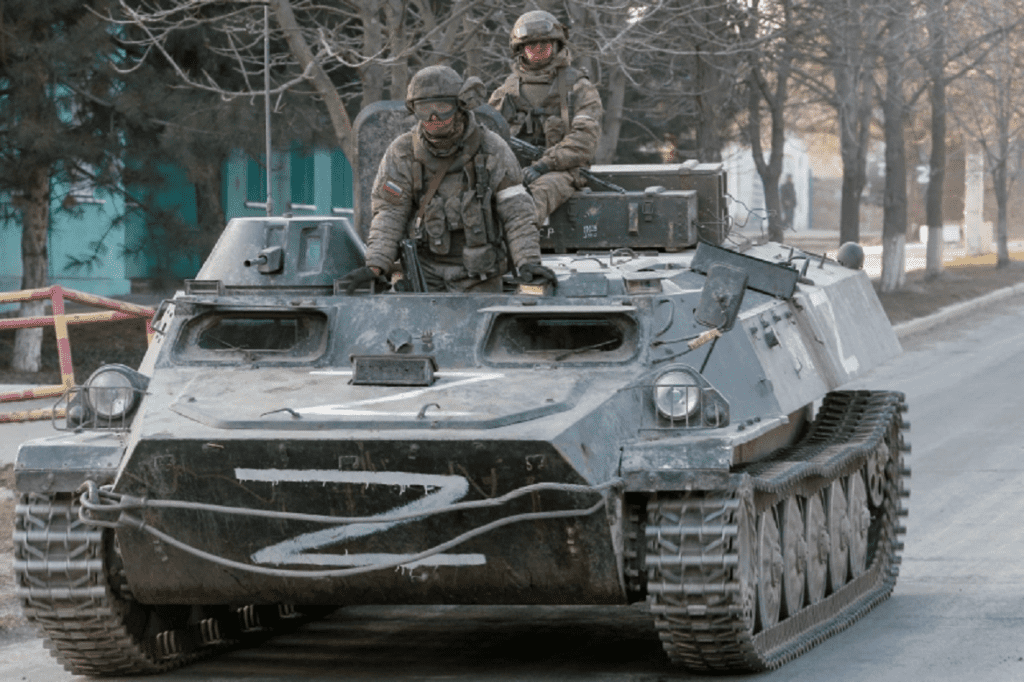By Anton Evstratov
The Russian military operation in Ukraine, and the ensuing confrontation between Russia and the West, has deeply affected the Eurasian space, confronting a number of countries with the choice between Moscow and Washington.

The military action in the center of Europe, and the anti-Russian sanctions imposed by the United States and its allies, affected vast areas, including Germany and Japan, and the reactions of these distant countries were very similar. After their defeat in World War II, both countries adhered to generally pacifist foreign policy orientations, which they are now reconsidering.
Germany first openly blamed Russia for the aggression, then announced the strengthening of its armed forces and increasing its military spending to 2 percent of GDP. In addition, the Bundeswehr immediately received a $100 billion tranche from the government to re-equip its facilities. It should be noted that at the moment the level of military training and arming of the German armed forces is rated as unsatisfactory even by its military experts. At the same time, Berlin, which needs Russian energy, cannot completely break away from Moscow, although it is taking some steps to do so – for example, the construction of two additional storage facilities for liquefied natural gas.
Japan has also strongly condemned Russia’s military action in Ukraine, and has supported Western sanctions against Russia, including those that will have a noticeable impact on Japan’s economy. Specifically, we are talking about the Sakhalin-1 and Sakhalin-2 oil and gas projects, in which Japanese companies SODECO, Mitsui & Co. and Mitsubishi Co. are involved and which provide much of the Rising Sun’s energy needs. The Japanese automotive industry, represented on the Russian market by Mitsubishi Motors Co, Nissan Motors Co and Toyota Motors Co, which sell their cars in Russia and have plants there, will suffer from the deterioration of relations between the two countries. Tokyo was one of the main promoters of Russia’s disconnection from the SWIFT international bank transfer system, but the sanctions against the Russian banking system, although partial, eventually created problems for Japanese companies operating in the Russian market and having difficulty receiving payments for their goods and services.
Russia is Japan’s second largest supplier of coal and fifth largest supplier of oil and liquefied gas, and adherence to anti-Russian sanctions inevitably affects the country’s energy sector as well. Tokyo appears to be willing to bear these costs. In addition, there is again talk of increasing the country’s military budget, and Ukraine has received military equipment, including armor and helmets, as aid. Kiev should soon receive $100 million in free aid from Tokyo, as well as the same amount as a loan – to fight “Russian aggression.”
The Rising Sun’s reaction to the Russian leadership’s decision to put strategic nuclear deterrence forces on alert was also extremely negative. Because of Japan’s generally hostile foreign policy line, the Russian response, the trickiest part of which was the refusal to negotiate a peace treaty between the two countries, which has so far been non-existent, should also come as no surprise. First of all, it means Moscow’s withdrawal from negotiations regarding its possession of the Kuril Islands, which Tokyo has been disputing since the end of World War II, even though it was defeated.
As for Japan’s nuclear fears, there is now some chance that their main source, North Korea, will move closer to Russia. Pyongyang has so far refrained from making unequivocal statements about the Russia-Ukraine conflict, but the other day it successfully tested a new ballistic missile. It landed in Japanese territorial waters, predictably drawing condemnation from both Tokyo and Washington. In Russia, for its part, there are rumors about the need for closer relations with North Korea and that Moscow refuses to support international sanctions against the country. For example, State Duma deputy Kazbek Taisaev expressed the same opinion. However, it is clear that for the Russian Federation this kind of rapprochement is not a tangible necessity, and if it occurs, it is likely only in the context of a general rapprochement with China, the DPRK’s main ally and partner.
For its part, the PRC, hampered by anti-Russian sanctions, has not only not abandoned its partnership with Moscow, but has also issued a number of anti-Western statements and noted the need to restore its sovereignty over Taiwan. Russia and China are currently not only economically linked (although economic ties between the two countries exist in almost every key sector, from oil and gas to high technology), they have similar attitudes to issues of sovereignty and territorial integrity. Moreover, Moscow and Beijing are the main actors and promoters of the construction of an economic and, in the long term, political Eurasian system, which has the possibility, against the background of the escalation of the confrontation with the West, to form an alternative pole, a new power center capable of facing the American-centric part of the globe on an equal or almost equal footing. Chinese transportation projects pass through Russia, these two countries cooperate in Central Asia and the Middle East, and already have considerable positive experience in this area. It makes sense to transfer this cooperation to a more global, worldwide level.
It is extremely revealing that, in light of the ongoing conflict, India, its metaphysical and geopolitical adversary, is on the same side of the emerging global “front line” with China. The latter have not only refused to join Russia’s isolation on the international stage, but have also expressed a desire to settle accounts with Moscow in domestic currencies, thus dealing a blow to the hegemony of the dollar in the global financial system. New Delhi is motivated by the fact that its army is and continues to be heavily armed with Russian weapons – Vladimir Putin and Indian Prime Minister Narendra Modi signed a military-technical cooperation agreement in 2021 for the next 10 years.
Moreover, Moscow has consistently supported New Delhi on the Kashmir issue and even blocked an earlier UN Security Council resolution against India over the region. Obviously, the countries have similar approaches to territorial integrity and protection of compatriots, so New Delhi’s refusal to condemn Russia at the UN General Assembly is understandable. India is also dependent on Russia for more localized interests, in particular, exports of its military hardware – currently, there is only one contract in this area, with the Philippines, and it concerns BrahMos supersonic missiles that it produces jointly with Russia. Undoubtedly, the United States and its allies are also important partners of New Delhi, including in the military-technical sphere, but the volume of the offer of the opposing parties and their experience in relations with India are such that the choice of the Modi government was predetermined. Furthemore, the Indian authorities have good reason to believe that the United States, realizing the non-alternative nature of relations between New Delhi and Moscow, would not try to block them and impose sanctions on the Indian side for fear of eventually losing such a valuable and promising partner.
The emergence of the latter’s main adversary, Pakistan, on the side of Russia and India may also be paradoxical. On the one hand, it is China’s ally and largely dependent on the Middle Kingdom. On the other hand, Islamabad is experiencing a deterioration in its relations with the United States, which is now replaced in poor Pakistan by the Chinese in almost all spheres, from military to humanitarian. In this context, the appearance of Pakistani Prime Minister Imran Khan in Moscow on the first day of the Russian military operation in Ukraine is understandable.
Turkey is hesitant to adhere to the positions of one of the centers of gravity in global politics. While condemning Russia’s annexation of Crimea and supplying Ukraine with Bayraktar drones and other military products, Ankara refrains from being openly hostile to Russia in the conflict. Moreover, Turkey relies on the role of moderator in the Russian-Ukrainian negotiations, commenting almost continuously on the parties’ positions, their negotiations, and points of contact. However, in the event of a tougher confrontation, Ankara will also have to make choices that may be locally pro-Russian but globally inevitably antagonistic to Moscow – Turkey expects to penetrate Russia’s sphere of influence in the South Caucasus, where it has pressure on Russia’s ally Armenia along with Azerbaijan, has interests in Central Asia and even Russia itself. Turkish interests include Crimea, which Turkish officials occasionally allow themselves to declare. In this context, the final Russian-Turkish confrontation can be expected, in which Ankara will either try to take advantage of Western help, or act alone, but it will happen relatively soon.
For Central Asia, the Russian-Ukrainian confrontation means that Kazakhstan, Tajikistan, and Kyrgyzstan – Russia’s CSTO allies – at least formally support the Russian policy line. The PRC’s loyalty to the latter will be an additional motivator for these countries. Uzbekistan, for which Russia is a key military partner and a prime economic partner, will behave similarly. For Kazakhstan, this is also relevant against the backdrop of recent bloody clashes and its receipt of assistance from the CSTO.
As for the other countries, their dependence on Russia is expressed mainly in the politico-military sphere, but also in the socio-economic sphere – we are talking about millions of migrant workers from Uzbekistan, Tajikistan and Kyrgyzstan who work in Russia and send remittances to their homeland. Undoubtedly, the depreciation of the ruble and the related price increase, as well as anti-Russian sanctions, will affect all Central Asian countries. The only country that has a significant margin of safety in this regard is Kazakhstan, but it too could face social problems due to unresolved social divisions after the latest clashes and possible difficulties with oil exports. At the same time, the pro-Russian course for these states has no alternative, as neither the US nor the EU has equal influence in the region as Russia and China. The latter, for its part, can compensate the Central Asian states for their economic losses due to anti-Russian sanctions; however, it will have to rebuild its economy in new realities and will do so only in doses and if absolutely necessary.
Author: Anton Evstratov (Russian historian, publicist and journalist living in Armenia, lecturer at the Department of World History and Foreign Regional Studies at the Russian-Armenian University in Yerevan).
(The views expressed in this article belong only to the author and do not necessarily reflect the views of World Geostrategic Insights).







